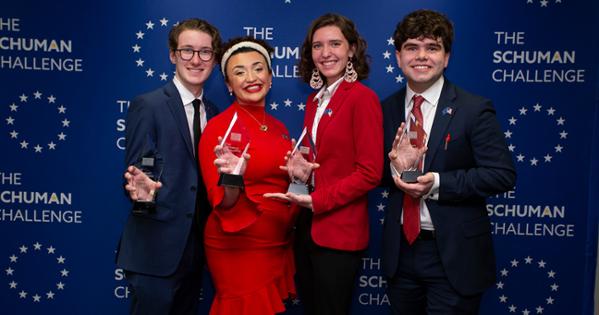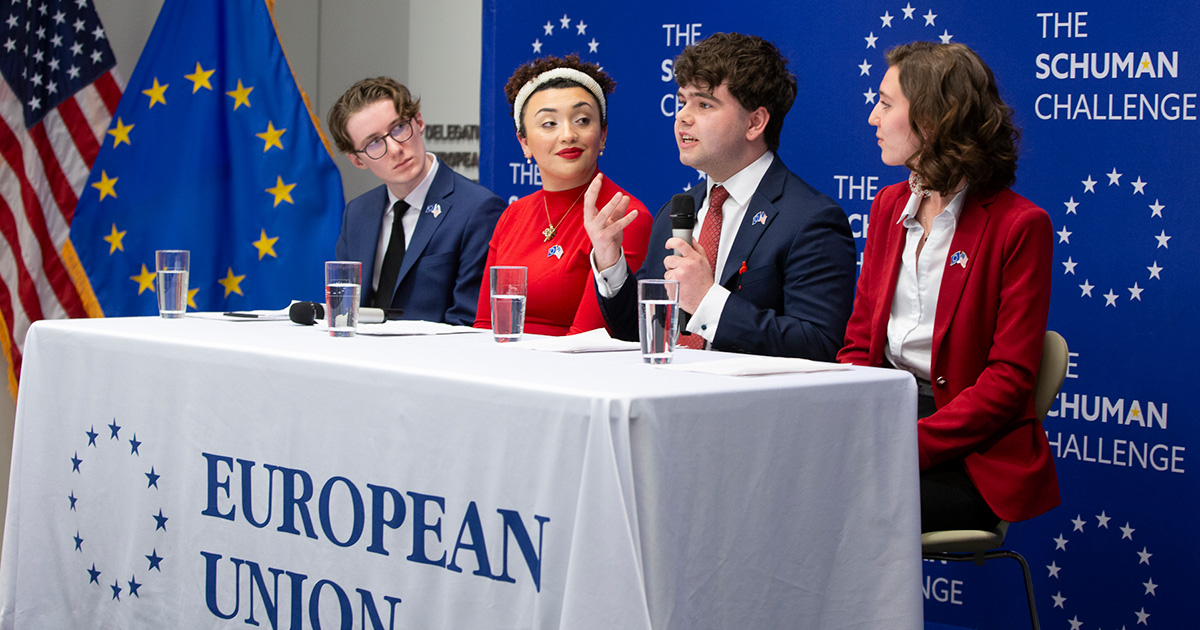AU Notches First Place in Schuman Challenge

“A model of teamwork.”
That’s how SIS professor Michelle Egan characterized American University’s recent win in the Schuman Challenge, an annual academic competition hosted by the EU Delegation to the United States.
On April 5, 2024, American University became repeat winners of the Schuman Challenge. Since 2017, the Schuman Challenge has provided a chance for undergraduate students from universities across the US to coalesce in Washington, DC, for an academic competition that challenges them to engage in dialogue on transatlantic policy issues. American University won the inaugural challenge in 2017, and this year, an AU team of four SIS students notched first place once again in the competition.
Named after Robert Schuman, the French foreign minister heralded as a founding father of European integration, the Schuman Challenge engages students in real policy issues that the EU and US face.
“The core of the competition is getting young, bright minds engaged in real-life problems and to try and provide concrete and actionable solutions,” said SIS professor Garret Martin, who helped to advise this year’s winning team.
This year’s winning team from AU was comprised of four SIS undergraduate students: Josh Eliot, Grace Roundcount, Kevin Farmer, and Gabby MacKay. The central question of this year’s competition was, “How can the EU and US more effectively engage the Latin America and Caribbean (LAC) region on areas of shared priorities and common interest?”
AU’s policy brief focused on utilizing space as a tool for international cooperation among the EU, US, and Latin American and Caribbean states. The proposal argued that enhancing satellite collaboration among these nations could help to address shared goals on climate change, digital connectivity, infrastructure, and space security.
Preparing for the Challenge
The team of students gathered in the early weeks of the spring semester to consider various topics for their policy brief and even spent several Sundays in an empty SIS classroom “throwing things at the wall and seeing what stuck,” said Kevin Farmer, SIS/BA ’26.
“We started completely from scratch,” Farmer said. “As part of the process, we had to anticipate what the other teams would be presenting. There were 28 other schools, and we needed to make sure we had a proposal that was relevant and creative enough that we were not one of five other teams coming in with a different proposal that tackles the same issue.”
It wasn’t until a few weeks into the semester that the team landed on space as the central focus of their project. Once the topic was selected, the “energy shifted” among the teammates as they dove headfirst into researching and writing their policy brief, said Gabby MacKay, SIS/BA ’24.
“It was such a unique experience to see everybody get so excited about [our topic],” MacKay said. “We had several members of the EU delegation, like junior level ambassadors and diplomatic staff, say this is a policy that they could very clearly see happening at some point in time.”
‘A Real Team Effort’
During the two days of competition, which was held April 4-5, 2024, in DC, AU was among 28 other schools presenting policy proposals and fielding questions from members of the EU delegation. On the first day, AU’s team gave a 10-minute presentation on their policy proposal, which was followed by 10 minutes worth of question-and-answer time from panelists.
 When the team returned for the second day of competition, they learned they made it to the finals alongside two other universities, Stanford University and the University of Utah. During the finals, the team presented to a panel of high-level judges, including EU Ambassador to the United States Jovita Neliupšienė, Chief of Staff for the Assistant Secretary General at the Organization of American States La Celia A. Prince, and three Heads of Section from the EU Delegation.
When the team returned for the second day of competition, they learned they made it to the finals alongside two other universities, Stanford University and the University of Utah. During the finals, the team presented to a panel of high-level judges, including EU Ambassador to the United States Jovita Neliupšienė, Chief of Staff for the Assistant Secretary General at the Organization of American States La Celia A. Prince, and three Heads of Section from the EU Delegation.
“It was an honor to present in front of such esteemed people, and also a little scary,” Josh Eliot, SIS/BA ’26, said. “We really relied on the work that we’d done and knowing each other well as a team—being prepared not only in our topical knowledge, but also being able to read each other’s questions and cues when it came time to answer questions.”
At SIS, students gain experience writing policy briefs as part of their undergraduate coursework—a skill essential for success in the Schuman Challenge. SIS courses also challenge students to critically think, which students on this year’s winning team said played a role in their win.
“The ability I’ve gained to zoom out and then zoom back in on topics…I think I really owe it to the way that SIS teaches their students to be critically analytical and really put the dots together to think beyond what’s in front of you and see a broader future,” MacKay said. “I think this [the Schuman Challenge] is one of the most rewarding things I’ve ever done. It is easily one of the best decisions that I've made in SIS.”
Egan, who advised the winning team of SIS students alongside Martin, praised the students for their ability to work as a team.
“This particular group of students did their own research, they chose their own topic—which was a risky one—they coordinated all the meetings, and they were very responsive to feedback,” Egan said. “It was a real team effort.”
Martin echoed a similar sentiment, praising the students for their ability to prioritize the Schuman Challenge among their many other activities and responsibilities during the semester: “This was student-led work, and it was impressive. I mean, these are students who have internships on the side, and two of our four students are active Model UN students, so to be able to balance all of those commitments and to still be that dedicated, that serious—the win is a bonus, but it’s quality of the work, it’s the seriousness of the proposal, and the thoroughness they put into it that is really incredible to watch as faculty. It’s the sort of best of what you expect from the students when you’re a professor at SIS.”
